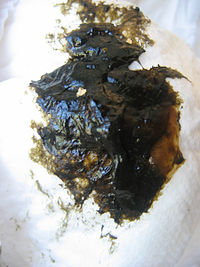
Photo from wikipedia
Objective: To determine the maternal factors and neonatal outcome of pregnancy complicated by meconium stained amniotic fluid. Methods: This one year retrospective study was conducted at the Agha Khan Hospital… Click to show full abstract
Objective: To determine the maternal factors and neonatal outcome of pregnancy complicated by meconium stained amniotic fluid. Methods: This one year retrospective study was conducted at the Agha Khan Hospital for Women-Garden Campus, it is a secondary care private teaching hospital. Demographics information included gestational age, gender and birth weight of baby, medical and obstetric complications during pregnancy, mode of delivery, neonatal outcome (Meconium Aspiration Syndrome (MAS) and need for admission in nursery) were recorded on a pre-designed proforma. Results: In our study the frequency of meconium stained amniotic fluid (MSAF) was 7.85%, out of them 12 % babies developed MAS. There was significant association between grades of meconium and MAS, babies with thick meconium were prone to develop MAS (P = 0.02). Emergency cesarean section was significantly associated with MAS. Gestational diabetes (GDM) and pregnancy induced hypertension (PIH) were the significant factors associated with MAS. Conclusion: Thick Meconium stained amniotic fluid was associated with low APGAR score, high rate of emergency cesarean section and meconium aspiration syndrome. Anemia during pregnancy, PIH and GDM were important risk factor associated with MAS.
Journal Title: Pakistan Journal of Medical Sciences
Year Published: 2018
Link to full text (if available)
Share on Social Media: Sign Up to like & get
recommendations!